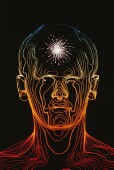
FRIDAY, Jan. 29 (HealthDay News) — Great news for working stiffs: You can take a break and feel good about it, new research suggests.
If you want to strengthen your memory, take a break after learning new information, say New York University researchers who found such “active rest” strengthens memory.
While sleep has been studied and found valuable as a way to preserve memories, less is known about how “active rest” during the day may affect them, said Lila Davachi, an assistant professor of psychology at NYU. So, she tested the memory of 16 study participants and evaluated the effect of rest on memory.
The study is published in the Jan. 28 issue of Neuron. The lead author of the study is Arielle Tambini, a doctoral candidate at NYU.
First, the researchers showed participants a series of images, each one pairing a face and an object. For instance, they looked at a “surfer dude” and a beach ball and were asked how likely the person was to be holding that object.
“After that, we asked them to rest,” Davachi said. As they rested, the researchers observed brain activity using functional magnetic resonance imaging (fMRI).
The investigators wanted to examine activity between the brain’s hippocampus and the neocortex. Long-term storage of memories is thought to result from the “off-line” transfer of information from the hippocampus to the neocortex, Davachi explained.
“The brain regions remained active during rest, suggesting a replay of the experience,” Davachi said. This suggested, but didn’t prove, that memories were being cemented, she noted.
So the researchers gave the participants the memory test after they had rested. “The subjects who had greater correlations between the two brain areas [during rest] had better associative memory,” Davachi said. “They remembered the face that went with the object [better].”
Another expert found the study results interesting. “I think it is important in that [the study] is showing that active rest is a time when you get this transfer of memory,” said Dr. Paul Sanberg, director of the University of South Florida Center for Aging and Brain Repair in Tampa.
The finding may help both in a practical way, for individuals trying to improve their memory, and in research, to help experts further understand memory and what goes wrong, he said.
For people, the finding suggests having a rest period after learning new information may be valuable, Sanberg added. He doesn’t know, however, if a coffee break would be the best way. It’s probably better to sit, do nothing and let the new information soak in, he suggested.
“By keeping on doing many different tasks [after learning new information], you may interrupt the memory you want to strengthen,” Sanberg said.
More information
Learn some tips on boosting your memory from the U.S. National Library of Medicine.

